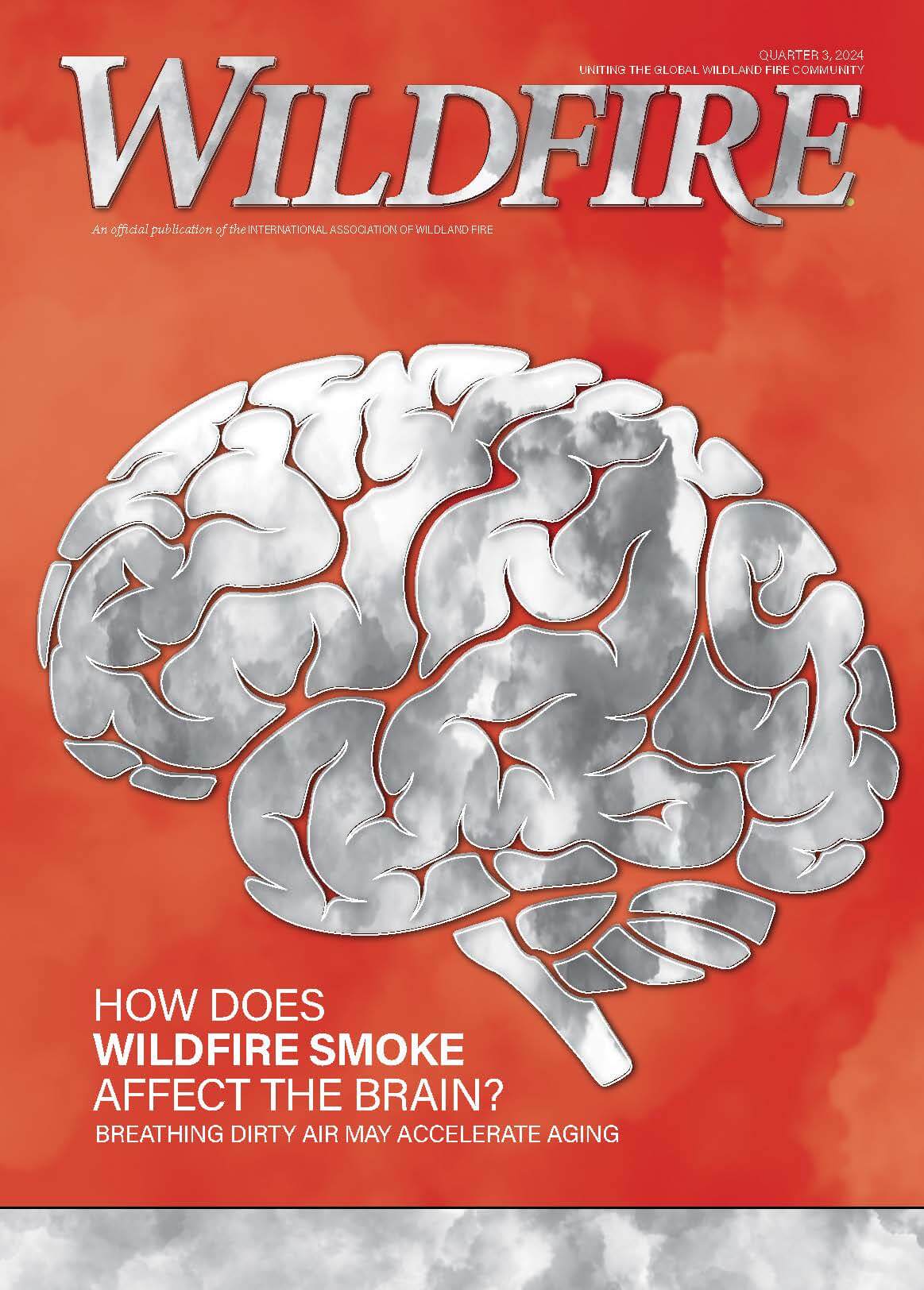2019 Firebreak Award for Excellence in Wildland Fire Management Recipient
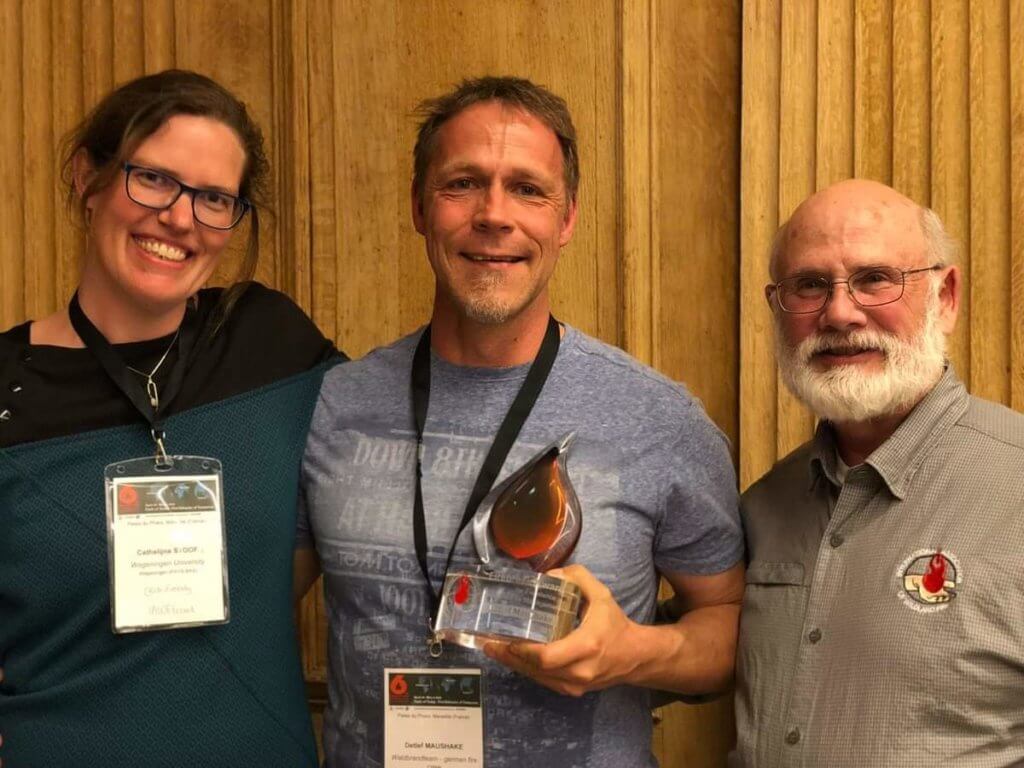
The “Management Award” was established to honor achievements and excellence in the management of wildland fire programs. This award recognizes someone who’s made lasting contributions to program management and inspired others through creativity, innovation, leadership, application, guidance, and communication in response to challenging and controversial wildland fire management issues.
IAWF is proud to announce that the 2019 recipient of the IAWF Management Award is Detlef Maushake. Detlef first became connected to the wildland fire community during a ride-along with the Los Angeles County Fire Department in California in 1997. The different approach of fighting fire with hand crews, aircraft, and the use of fire combined with the lack of specialized training in Germany aroused his interest.
Since this time, his is a story of passion, interest, and selfless commitment. He continued to travel to the USA usually taking vacation time and paying his own costs to learn and grow his skills. He also attended courses and rode along with local agencies.
Back in Germany, he spent time teaching local fire agencies how to safely attack wildfires and how to adapt US and German tactics to the local environment. This eventually expanded to the use of using live fire for real training scenarios. As part of a German disaster response team, he delivered a presentation at the 2009 10th Wildland Fire Management Safety Summit in Phoenix, Arizona, about the use of National Wildfire Coordinating Group (NWCG) based training to enhance firefighter safety fighting fires in Germany.
Forestry, fire departments, and other agencies were all working separately in Germany (and still do in some instances). Detlef’s goal has always been to bring everyone to the table to discuss synergies, training principles, and tactics. His teaching methods and mentoring, not only as a student of fire but also as a leader, are well known in Germany. Many of his developments and suggestions to the agencies are based on the NWCG wildland fire and leadership materials which he adopted and translated so they would fit into the European system.
The disaster team responded for several missions to northern Portugal under Detlef’s command to aid local resources in Vila Real and surrounding villages with a hand crew and engine support team. He taught the dangers of the Wildland Urban Interface (WUI) to local fire departments when asked to do so by the Fire Chief of the city of Vila Real.
Detlef has contributed to several articles and two books about vegetation fires in Germany and delivered numerous training sessions regarding the safe and effective use of handtools and mobile teams with backpack pumps and small diameter fire hose; a tactic seldom used in Germany until Detlef paved the way for increased use.
Detlef developed a proposal for ordering new fire trucks with a supplemental equipment package including small-diameter hose and backpack pumps. This has led to the reconfiguration of official standards for forest fire trucks in Germany.
In 2015, Detlef realized that the multi-functional disaster response team with a USAR team and other diverse goals was not meeting the goal of establishing a fully functional, mobile, tactical fire crew structure. So he formed new alliances, almost from scratch, that brought all stakeholders together to create a fully functional Type 2 Initial Attack crew.
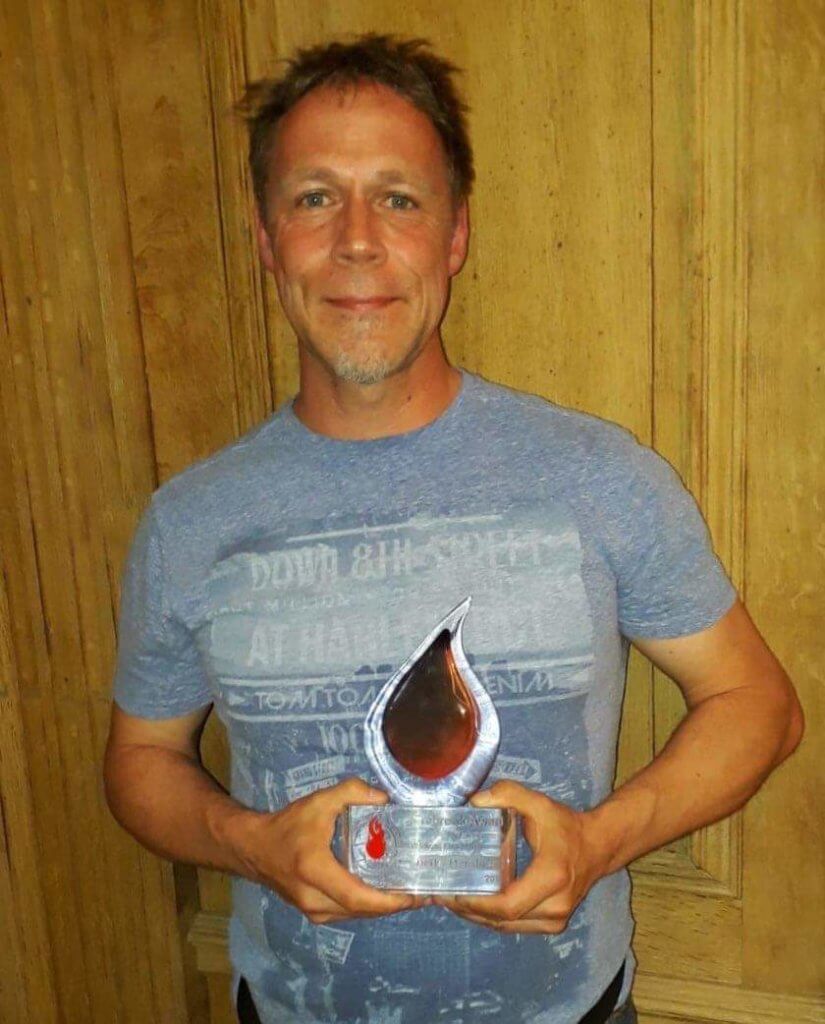
This new association, Waldbrandteam Fire Crew, has been in existence since February 2015. Detlef has made major contributions to the equipment and training of the unit. The Waldbrandteam received recognition in 2017 in IAWF’s Wildfire Magazine (Wildfire June 2017) as Fired Up honorees. All team members are volunteers and their contributions involve taking time away from regular jobs and families to go abroad and help others, often on their own vacation time. The guiding association for the Waldbrandteam is a Non-Governmental Organization that relies on membership fees and donations to help defray travel expenses and equipment. Their equipment ranges from a full set of hand tools, a small, self-sufficient fire camp with tents and mess equipment up to a Mark 3 pump with hose and nozzles. All of the equipment is either donated or purchased with money Detlef receives during presentations for fire departments and other agencies.
His teaching goes far beyond the borders of Germany. He teaches the leadership course “Helicopter Wildfire Support – Branch Leader” at the Tyrolean Fire Academy and other locations in Austria. His main topics are the use of the Campbell Prediction System and the effective use of helitack crews.
Being the President of an all-volunteer, non-profit wildfire team means investing a lot of time and enthusiasm apart from his fulltime job as a fire captain/paramedic for the Salzgitter City fire department in northern Germany and volunteering as a firefighter for the local fire company in his village.
There is no doubt that Detlef Maushake has spent the past 20 years thinking, living and teaching wildfire safety. His groundbreaking accomplishments with the Waldbrandteam and in operational and safety training are significantly advancing wildland fire operations in Europe and many other areas of the world.
2019 Early Career Award in Fire Science Recipient
The IAWF Early Career Award in Fire Science was established in 2015 to recognize a promising young professional who has demonstrated outstanding ability in any field of wildland fire science.
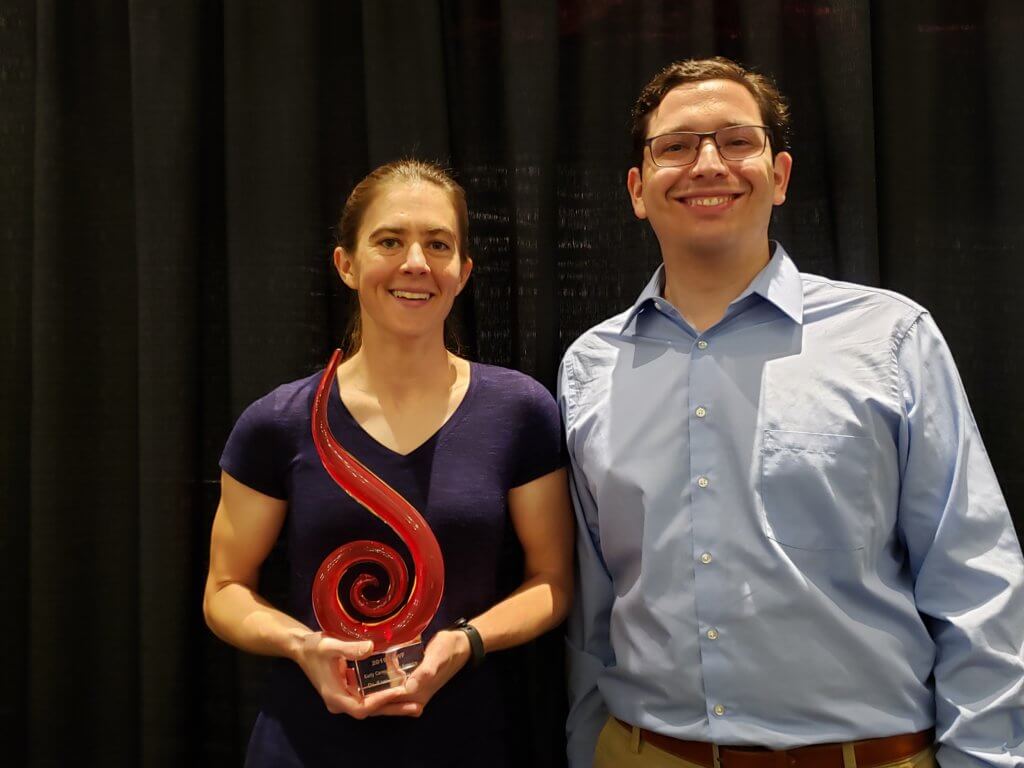
IAWF is proud to announce that the 2019 recipient of the IAWF Early Career in Fire Science Award is Dr. Sara McAllister. Sara has been a Research Scientist for the US Forest Service at the Missoula Fire Sciences Laboratory since 2009. She graduated from the University of California, Berkeley with a Ph.D. in Mechanical Engineering where she focused on spacecraft flammability for NASA. Her background in combustion and engineering has enabled her to bring unique insight into the physical processes controlling ignition, fire spread, and burning.
Since her arrival at the Missoula Fire Sciences Laboratory, she has performed ground-breaking experimental research on ignition criteria for live and dead wildland fuel materials, explored poorly understood convective heating of live and dead forest fuels, and extended knowledge and theory of burning rates of porous wildland fuel beds. It is rare that in such a short time, one researcher could have made so much progress in this direction.
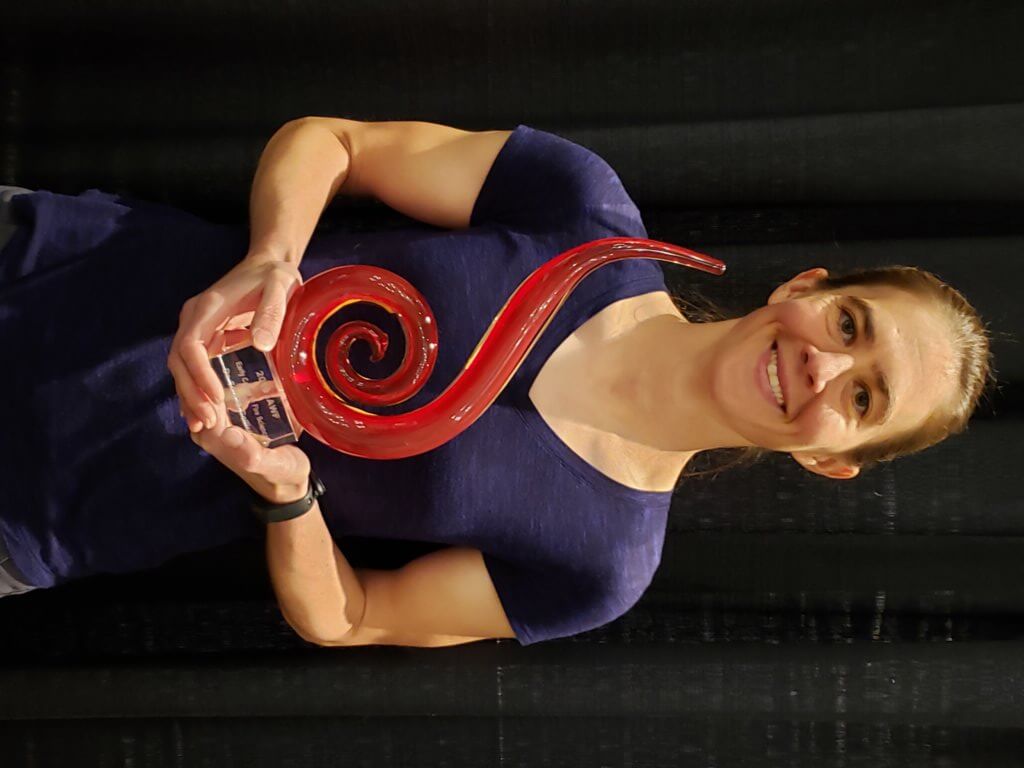
Sara is the author of 28 refereed publications and 35 conference presentations and proceedings, as well as a popular university textbook, “Fundamentals of Combustion Processes” which is based on a course she co-taught while at UC Berkeley. She is a leader in the field, promoting wildland fire science in both traditional wildland fire organizations and the engineering community. Some of her recent leadership activities have included co-organizing the workshop “Large Outdoor Fires and the Built Environment”, co-organizer of a special session for Forest Fire at the 8th International Symposium on Scale Modeling, section editor for the Encyclopedia of Wildland and WUI Fire for Springer-Nature, and leader of a special session at the AFE Fire Congress on “Physical Mechanisms of Wildland Fire Spread”.
Recently, she was appointed as the scientific program co-chair for the 12th International Symposium on Fire Safety Science and also leads a new working group on Large Outdoor Fires and the Built Environment, helping to link the fire science and structural fire communities. She is active in the Combustion Institute, International Association for Wildland Fire (IAWF), Association for Fire Ecology, and the International Association for Fire Safety Science (IAFSS). In total, she’s chaired or co-chaired 11 symposia and special sessions and serves as an active member of the Editorial Board for Fire Technology and Fire Safety Journal. All these activities demonstrate her continued commitment to linking the traditional building and wildland fire science communities together.
Sara is one of the most promising and impactful young researchers in the wildland fire community today. She has made outstanding scientific contributions and demonstrated leadership in the wildland fire community, and is incredibly deserving of recognition by IAWF with the Early Career Award in Fire Science.
2019 Early Career Award in Fire Operations Recipient
The IAWF Early Career Award in Fire Operations was established in 2016 to recognize a promising early-career professional who has demonstrated outstanding ability in any field of wildland fire operations.
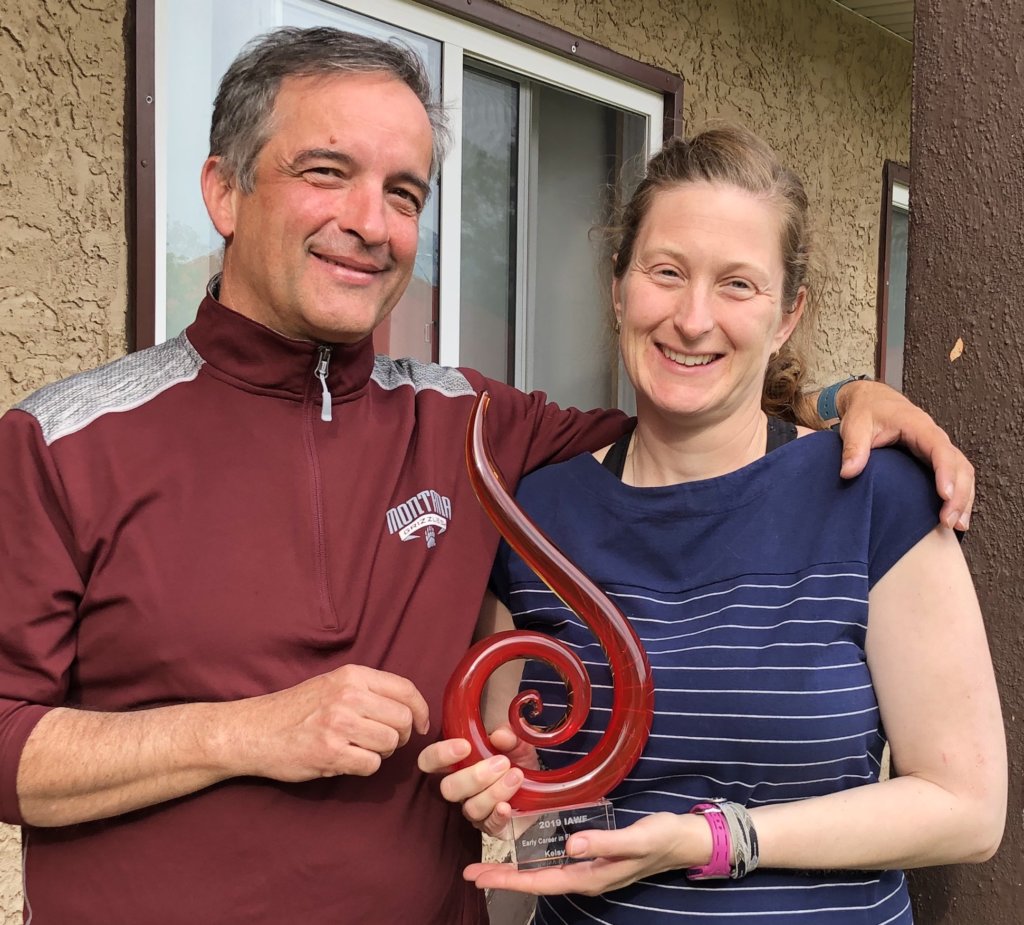
IAWF is proud to announce that the 2019 recipient of the IAWF Early Career in Fire Operations Award is Kelsy Gibos. Kelsy started her fire career with ENSIS in New Zealand working as a fire behaviour researcher with a focus on fuel inventory and experimental burning. She then returned to Canada, working in Alberta on operational research topics such as technical evaluation of equipment and suppression methods, and experimental burning and fuel measurement. During this time she completed a Masters of Science in Forestry (emphasis on Fire Behaviour) and worked on a pre-formed incident management team as a fire behaviour analyst. Her FBAN work has been highly praised by her peers.
She then went to Australia and spent four years working with the Victorian DSE and CFA where she was involved with research on Black Saturday fire behaviour, as well as firefighter and fire behaviour analyst operational response work. After that, she returned to Alberta working as a Wildfire Management Specialist. Recently Kelsy served as a training specialist at the Hinton Training Centre (Canada).
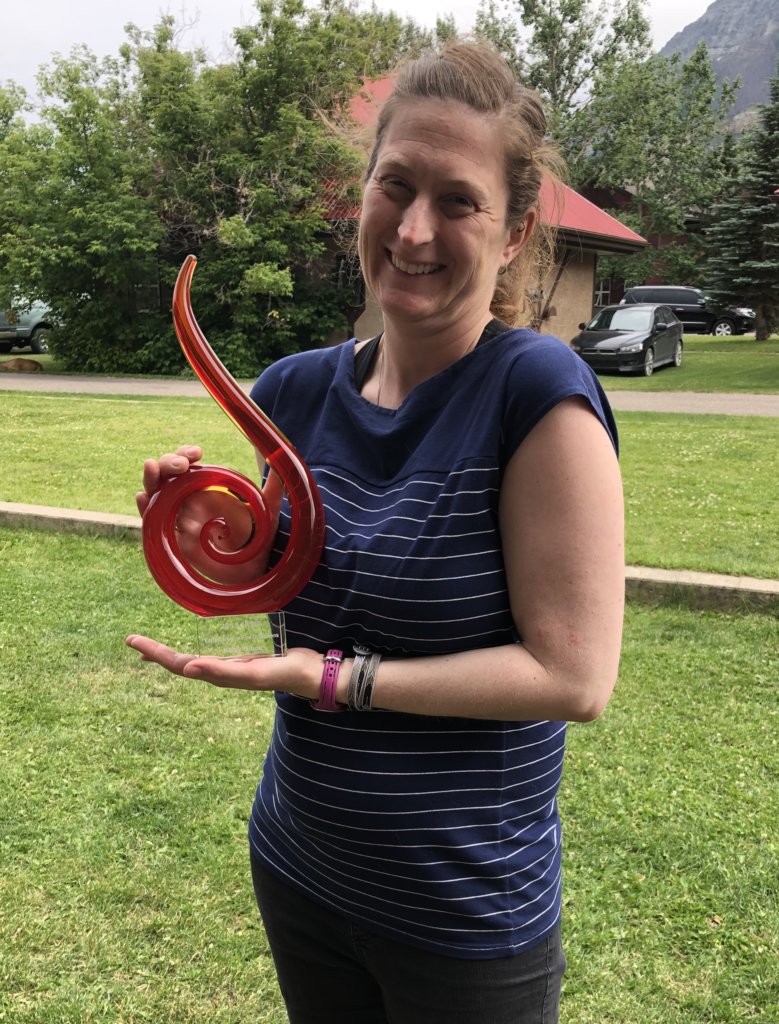
Her mix of operational and research experience has given Kelsy unique tools to drive her high impact work. She made significant contributions toward developing an innovative Bushfire Predictive Services strategy for the state of Victoria (Australia). Key to the success of this work was how Kelsy was able to successfully liaise with a wide range of wildfire-related personnel and find ways to embed the best science into decision making.
She has also been actively developing and sharing her knowledge through fire behaviour research. She’s authored or co-authored of a number of peer-reviewed papers focusing on rotary-wing thermal infrared service delivery, protecting wildland firefighters from smoke exposure, exploratory research into the existence of “humidity domes” created by wildfire sprinklers, reconstructing the spread and behaviour of the February 2009 Victorian Fires, and relationships between severe landscape dryness and large destructive fires in Victoria.
Kelsy continually shares information and helps people make and maintain connections. She has been a strong supporter of the IAWF Students of Fire concept, regularly promoting the concept and providing information for her peers. She’s also participated in conferences and workshops around the world, including helping organise the IAWF Fire Behaviour and Fuels conference in Portland, and IAWF Safety Summit / Human Dimensions Conference North Carolina.
Kelsy is a highly productive and respected young specialist in wildland fire management throughout numerous countries. She’s made outstanding contributions and demonstrated leadership in the community, and is incredibly deserving of recognition by IAWF with the Early Career Award in Fire Operations.
